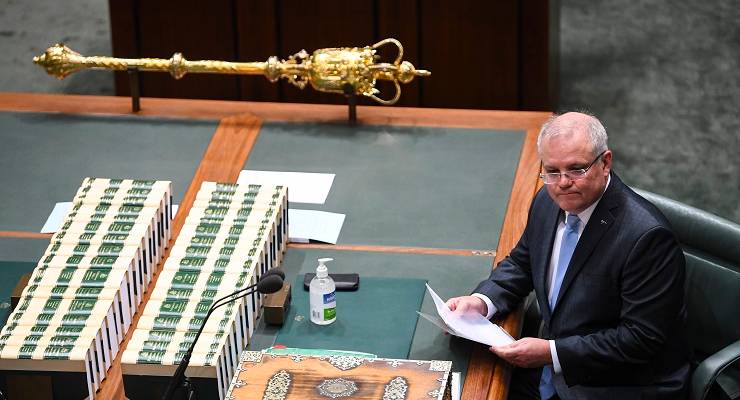
Australian politicians seem to be alone in shirking their duties by not showing up to parliament for the next few months, ostensibly because of the COVID-19 pandemic.
The Parliamentary Library, in something of an implied rebuke of the government, last week posted a short paper noting which parliaments had suspended sittings. It found that parliamentarians in the US, the UK, Canada and New Zealand would all be returning to parliament later this month or, in the case of Congress, hadn’t altered its sitting plan at all.
In Australia, every parliament except those of South Australia and Western Australia have adjourned until later in the year, or indefinitely.
Labor opposed the suspension of federal parliament until August, and Anthony Albanese has this week ramped up his criticism of the government’s decision, pointing out parliament “wasn’t suspended during the Spanish flu, or World War I or World War II”.
Shadow attorney-general Mark Dreyfus went further, saying “the parliament gave the government its extraordinary powers to respond to the current public health crisis. It is absurd and dangerous to suggest that the parliament now has no role in ensuring that these emergency powers are being exercised in the best interests of their constituents and of our nation”.
Dreyfus quoted the UK Tory government’s Commons leader, the hard-right Jacob Rees-Mogg, who said of the Commons “parliament’s role of scrutinising government, authorising spending and making laws must be fulfilled”.
The suspension of parliament plainly suits Scott Morrison. From the beginning of his time as a minister, Morrison has consistently demonstrated a thin skin and a deep aversion to any kind of scrutiny, whether from the media or from parliament.
Even his regular media briefings during the pandemic response have been marked by an ill-tempered hostility to journalists. The prime minister appears to regard questioning of his actions or attempts to elicit information as a personal insult.
But Morrison is hardly alone, and this is hardly a partisan issue. Victoria’s Daniel Andrews, who has pushed his government’s draconian lockdown demands to nonsensical lengths, has gone even further than Morrison and suspended parliament indefinitely, a move criticised by Victorian opposition leader Michael O’Brien as “extraordinary”.
The Palaszczuk Labor government in Queensland has similarly stopped sitting until further notice. Gladys Berejiklian won’t return to NSW parliament until September.
At the same time as federal politicians and politicians outside SA and WA are having an extended break to avoid getting infected, they’re asking health workers to put themselves in harm’s way to deal with the impacts of the pandemic. Morrison wants teachers to continue to show up to work, even as his own chief medical officer warns older teachers were at risk. And as Dreyfus notes, there are ways of reducing, if not eliminating, concerns about infection in parliament, through reduced numbers of MPs or greater use of technology.
Why do British politicians, and those of other anglophone countries, feel their parliamentary work is important enough to carry on through the crisis, despite the greater risk of infection even with precautionary measures being taken, when Australians don’t?
The House of Commons has a greater tradition of independence, and an independent speaker, unlike Australian parliaments. Congress is completely separate from the executive. And the Canadian and New Zealand governments are both minority governments, unlike the Morrison, Andrews, Berejiklian and Palaszczuk governments.
Where executives dominate, parliament is evidently seen as an inconvenience, at a time when scrutiny of executive government is more important than ever. The pandemic appears to be an excuse to avoid it as much as possible.








Crikey is committed to hosting lively discussions. Help us keep the conversation useful, interesting and welcoming. We aim to publish comments quickly in the interest of promoting robust conversation, but we’re a small team and we deploy filters to protect against legal risk. Occasionally your comment may be held up while we review, but we’re working as fast as we can to keep the conversation rolling.
The Crikey comment section is members-only content. Please subscribe to leave a comment.
The Crikey comment section is members-only content. Please login to leave a comment.